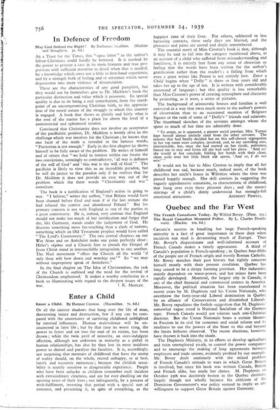In Defence of Freedom
May God Defend the Right ! By Nathaniet Micklem. (Hodder and Stoughton. 3s. 6d.)
As a Tract for the Times, this " open letter ".to the author's fellow-Christians could hardly be bettered. It is marked by the power to present a case. in its main features and true pro- portions with sufficient attention to detail when that is needed, by a knowledge which owes not a little to first-hand experience, and by a strength both of feeling and of utterance which never degenerates into mere violence of denunciation.
These are the characteristics of any good pamphlet, but they would not by themselves give to Dr. Micklem's book the particular distinction and value which it possesses. Its special quality is due to its being a real contribution, from the stand- point of an uncompromising Christian faith, to the apprecia- tion of the moral nature of the struggle in which this country is engaged. A book that shows so plainly and fairly what is the root of the matter has a place far above the level of a controversial and ephemeral treatise.
Convinced that Christianity does not involve an acceptance of the pacificistic position, Dr. Micklem is keenly alive to the challenge which war involves for the Christian ; he knows that one facet of the truth is revealed in the famous words, " Patriotism is not enough." Early in the first chapter he shows himself to be fully aware of the problem. He writes of himself and of others that " we hold in tension within our hearts the two convictions, seemingly so contradictory, all war is defiance of the will of God' and this war is the will of God." The pacificist is likely to view this as an incredible paradox, but he will do justice to the paradox only if he realises that for Dr. Micklem it does not provide an easy way out of the problem which the three words " Christianity and war " constitute.
The book is a justification of England's action in going to war. " I believe," writes the author, " that Britain would have been shamed before God and man if at the last minute she had refused the contest and abandoned Poland." But his primary concern is not with England as one of the parties to a great controversy. He is, indeed, very anxious that England should not make too much of her justification and forget that she, like Germany, stands under the judgement of God. He discerns something more far-reaching than a clash of nations, something which an Old Testament prophet would have called "The Lord's Controversy." The two central chapters on our War Aims and on Antichrist make one point perfectly clear :
Hitler's regime and a Church free to preach the Gospel of Jesus Christ stand in irreconcilable antagonism to one another.
The Nazi movement " offers the Church all the world if only thou wilt bow down and worship me." So " we may without impropriety speak of Antichrist."
In the final chapter on The Idea of Christendom, the task of the Church is outlined and the need for the revival of Christendom emphasised. It makes a worthy conclusion to a book so illuminating with regard to the deepest issues of the




































 Previous page
Previous page